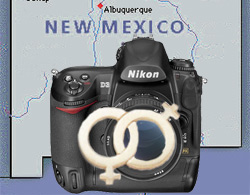Xerox - "MyShot" Takes Aim At Unsuspecting Students
 Xerox (NYSE: XRX) seems to have a problem with a healthy respect for photographers copyrights. Namely, if you are a student, they want yours. I've been watching this latest in photo contest rights grabs. At first, Xerox wanted ownership and unlimited use of all entries, by both Xerox, and their undefined "designees", and they wanted to use all entries (not just the winners) for any and all marketing purposes, and furthermore, they wanted to prohibit you from using your own work for anything but self promotion for 5 years. The fine print of the contest rules adds insult to injury, stating that all entries (not just the winners) are owned by Xerox.
Xerox (NYSE: XRX) seems to have a problem with a healthy respect for photographers copyrights. Namely, if you are a student, they want yours. I've been watching this latest in photo contest rights grabs. At first, Xerox wanted ownership and unlimited use of all entries, by both Xerox, and their undefined "designees", and they wanted to use all entries (not just the winners) for any and all marketing purposes, and furthermore, they wanted to prohibit you from using your own work for anything but self promotion for 5 years. The fine print of the contest rules adds insult to injury, stating that all entries (not just the winners) are owned by Xerox.
Yikes!
Recently, Xerox inserted an explanatory text box on the rules page, with a carefully crafted statement that on the surface, appears to indicate that their usage is limited to “winning photographs” for an 18 month period. A careful reading of this new text reveals that Xerox merely limited the period of exclusivity, and not the usage period. The fine print still provides Xerox with ownership and unlimited usage of any and all entries, including non‐winners, for an unlimited time, in all countries, throughout the world. Rather than limiting usage of the photographs to promotional use related to the contest, the rules provide Xerox with the unrestricted right to use winning photographs for any and all advertising, promotional and other purposes without further compensation to the student photographer. Apparently, someone at Xerox got the bright idea to use a photo contest to source images for their ad campaigns. Scoundrels!
But it gets worse.
What makes this contest particularly egregious is that Xerox has set their sights on unsuspecting student photographers, who are often eager to see their work in print, and are unlikely to read the fine print, and do not yet understand how to protect their rights. Further, they are using the schools and faculty members, many of whom might not read the fine print, to draw students into the contest.
And there's more:
Each winner is required by the rules to certify that they will "hold harmless" Xerox in the event that any third party sue sues Xerox as the result of their use of the photographs in their advertising. Nice - Let's take a billion-dollar company and transfer millions of dollars in liability to a student contest entrant who is already weighed down with student loan debt and is about to enter the profession during one of the most challenging periods in the history of photography. While it may be reasonable for Xerox to require that students certify that they are in fact the copyright owner of an entry and have obtained proper model releases from pictured subjects, Xerox steps over the line yet again by limiting the entrant's ability to sue Xerox in the event that Xerox oversteps it's already egregious boundaries for use of the photos, essentially eviscerating the rights of the entrant.
Further, the language of the contest rules would confuse even an experienced, seasoned professional photographer.
Oh, and one more thing - if you're "lucky enough" to be a winner, you have to sign a separate, as yet undisclosed contract with Xerox. It probably has something in there about giving away your first born or something. To an aspiring photo student, it feels the same way to do so with your first, best, images.
This contest (and others) should be about who took the best picture, not about who can screw unsuspecting students and photographers out of their rights. Xerox, time to get the white‐out. and Limit your usage to winning entries only, and only to promotion of the myShots contest. Remove the terms providing Xerox with ownership of entries. Revise the “hold harmless” clause to remove any liability placed upon the students, other than for falsifying their copyright ownership information. Limit the exclusivity clause to Xerox competitors only, and apply this only to the more significant prize winners. Allow students to make use of their own photographs during the exclusivity period, provided that they do not license usage to Xerox competitors. Provide students with approval rights and market‐rate compensation in the event that any winning image is selected by Xerox for usage other than promotion of the contest. Respect the rights of students and photographers. Do the right thing.
If you want to read the rules, check this link. MyShot08 contest rules.
After choking back the bile, send an e-mail to these folks:Be sure to take note of the folks who have signed on as sponsors of this
This is just getting silly. If your company relies on photographers, before you agree to sponsor contests/events, you should have as a requirement that you get to read and sign-off on contest/event rules so you don't reap the ire of the photo community!
Please post your comments by clicking the link below. If you've got questions, please pose them in our Photo Business Forum Flickr Group Discussion Threads.
 There are lots of topics on the subjects of rights I could discuss, though this wouldn't normally be one. But as it deals with the business of being a photographer, it deserves our attention. It's when a photographer is alleged to have violated the human rights of someone else.
There are lots of topics on the subjects of rights I could discuss, though this wouldn't normally be one. But as it deals with the business of being a photographer, it deserves our attention. It's when a photographer is alleged to have violated the human rights of someone else. Yesterday was the day I had been waiting for for
Yesterday was the day I had been waiting for for 